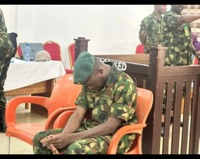
When Nigerians say “truth is stranger than fiction,” this might be exactly what they mean. A young soldier, trained to defend his nation, has now been condemned to death by hanging — not for desertion, not for mutiny, but for the cold-blooded murder of a tricycle rider in Bauchi.
This is the story of Private Lukeman Musa, and how one night of violence has now etched his name into Nigerian military and criminal history.
A Soldier Turned Killer
According to the General Court Martial sitting at Maxwell Khobe Cantonment in Jos, Plateau State, Musa didn’t just commit a crime — he orchestrated one.
He and his accomplice, known only as “Oba,” lured Mr. Abdulrahman Isa, a humble keke rider, to Musa’s home under the guise of friendship. But instead of hospitality, Isa was ambushed, strangled, and left lifeless.
The two men then dumped the body between Shira and Yala villages in Bauchi State. The motive? To sell off Isa’s tricycle.
What makes this worse: when Musa was arrested, he was found with 34 rounds of 7.62mm special ammunition in his possession — unauthorized, unlawful, and deeply suspicious.
The Verdict: Death by Hanging
On Thursday, September 18, 2025, the gavel fell. The military court found Musa guilty of culpable homicide and sentenced him to death by hanging.
The court also gave him two years imprisonment for unlawful possession of ammunition.
The presiding judge didn’t mince words — a man trained to protect had become a predator.
The Bigger Picture: Questions Nobody Is Asking
This case goes beyond just Musa. It raises hard questions Nigerians cannot ignore:
How did a serving soldier feel bold enough to kill a civilian for material gain? What does this say about discipline in the military? If one soldier could do this, how many others are walking the same dark path?
For every Isa who dies in silence, how many stories never reach the headlines?
From Keke to Coffin: The Human Tragedy
Let’s not forget the human side: Abdulrahman Isa wasn’t just a tricycle rider. He was someone’s son, someone’s breadwinner, someone’s future.
His life was cut short not by armed robbers on the road, not by terrorists in the bush, but by the very man sworn to safeguard Nigeria.
And now, Musa himself awaits his final fate — not on the battlefield, but at the gallows.
Why This Story Matters
Diaspora Nigerians, global observers, and everyday citizens should care because this is more than crime news.
It’s about trust: Can Nigerians trust those in uniform?
It’s about justice: Does a hanging sentence solve the deeper rot within the armed forces?
And it’s about humanity: the fragile line between protector and predator.
Final Word: Story No Clear
In Nigeria, sometimes the headlines write themselves:
A soldier murders a keke rider. The law responds with the gallows. A family mourns. A nation wonders: Who really protects us?
The story is simple. Yet the story is not clear.